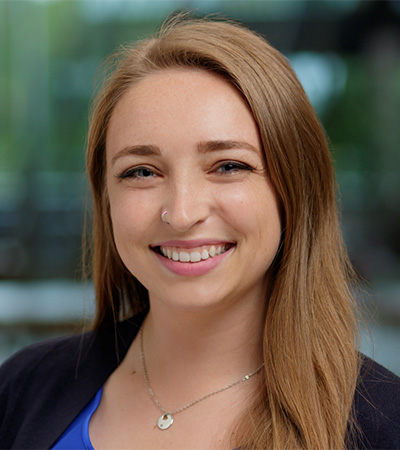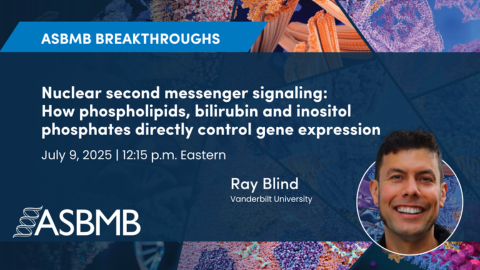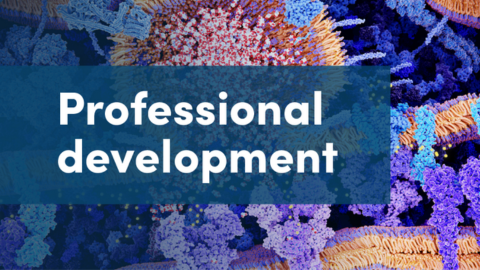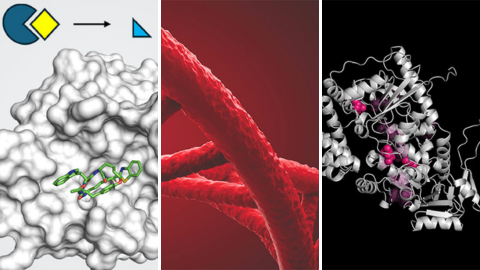Facing the challenges of an M.D./Ph.D.
Graduate school is challenging, no matter what degree you seek. Those who want to become physician–scientists face the ups and downs of not just one, but two graduate programs — medical school and a Ph.D. program.
To get a better understanding of how M.D./Ph.D. programs work and the unique challenges these students face, I talked to Hayley Powers, a student in the medical science training program, or MTSP, at the Medical College of Wisconsin. Powers is a fourth-year medical student, meaning she’s finished the Ph.D. portion of her program and is in her last year of med school.
How does an M.D./Ph.D. work?
Powers’ MSTP program uses what she called a “2+4+2” model: Students go through the first two years of medical school, then complete their Ph.D. in an average of four years, and then finish the last two clinical years of medical school. While the length of the Ph.D. portion may vary from three to five years, Powers said the overall program typically takes eight years.

Program structures vary among schools, with different splits between med school and graduate work. Powers said her school is moving toward a new model: The first two years of medical school, sometimes called the preclinical years, will be condensed into 18 months. This means MSTP students who re-enter medical school after earning their Ph.D. can do so in January or July, compared to only July with the original model. Medical school is typically conducted in a more traditional semester-based schedule, unlike graduate school in which Ph.D. students may defend at any point during the semester. Therefore, the typing of both programs needs to be considered for MSTP students.
Finding balance
Graduate school and medical school are very different, in both structure and priorities. Powers said they felt opposite to her — in medical school, the path forward and milestones are clearly defined. Students need to study, pass exams, complete clinical duties and pass the boards.
“There are strict deadlines, heavily reviewed curriculum, constant reminders, and lots of supervision,” Powers said.
On the other hand, graduate school has fewer strict deadlines and more flexibility with curriculum and working hours.
“There are many things that count as ‘work’ in graduate school: experiments, analysis, writing, presenting, networking,” Powers said.
It may be hard to find the right approach to these very different worlds.
Throughout her MTSP program, Power said she has mostly focused on either the M.D. or the Ph.D. portion. When she was in graduate school, she rarely did medical school activities aside from occasional clinical volunteering, and in medical school she had little time for research. She said the fact that both programs require full attention is good training for the future.
“Through our careers, we have to straddle the two worlds, both of which demand 100% of your attention and effort,” she said. “Learning how (to switch) between the two sides is part of the skill set we need to master to be physician–scientists.”
To balance both worlds and also a personal life, Powers said time management and organization are key.
“Keeping a calendar is truly the only way I am able to manage jumping from classes to meetings and clinical obligations,” she said. “Blocking off time for writing, assignments and personal time has also been helpful and something I am still working on mastering.”
Overcoming challenges
Graduate school and medical school are both hard, and every M.D./Ph.D. program comes with its own hurdles.
“Both are incredibly challenging and require your full attention,” Powers said. “I think having a strong work ethic is critical to success in both portions of the training.”
Aside from good study habits and organization skills, Powers said her attitude and approach also had a positive impact.
“I was taught a phrase from my parents, ’you only get out what you put in,’ and I find it applies perfectly to M.D./Ph.D. programs,” she said. “If you dedicate ample time and robust effort, you will find you learn and grow more.”
Powers advises anyone interested in an M.D./Ph.D. program to think about what they want from their future career. Does that path require both an M.D. and Ph.D.?
“Be sure you have your heart in both academic medicine and research before you start,” Powers said. “You will definitely need to have the passion and drive to support you as this is a long program with a lot of ups and downs.”

Enjoy reading ASBMB Today?
Become a member to receive the print edition four times a year and the digital edition monthly.
Learn moreFeatured jobs
from the ASBMB career center
Get the latest from ASBMB Today
Enter your email address, and we’ll send you a weekly email with recent articles, interviews and more.
Latest in Careers
Careers highlights or most popular articles

Upcoming opportunities
Friendly reminders to register for the upcoming ASBMB Breakthroughs webinar on nuclear second messenger signaling and ASBMB's in-person symposium on proteomics in Cambridge, Mass.

2025 PROLAB awardees announced
Seven early-career scientists receive grants to advance their research by working in North American labs.

Upcoming opportunities
Register for ASBMB's upcoming free professional development webinars on women in science and commercializing biomedical research.

Teach, learn & transform biochemistry education
Meet the co-chairs of the 2025 ASBMB meeting on reimagining undergraduate education in the molecular life sciences to be held July 24–27, 2025 in St. Paul, Minnesota.

Upcoming opportunities
Submit your abstract for ASBMB's upcoming meetings on nucleophilic proteases, gene expression and O-GlcNAc.

Upcoming opportunities
Friendly reminder: Submit your abstracts for upcoming ASBMB meetings! Just added: virtual events on AI and STEMM graduate education.

